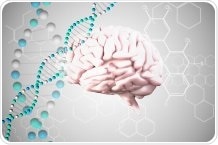An international collaboration headed by the University of Exeter, combined and evaluated data from over 1,400 participants across six different investigations in a meta-analysis published in the Nature Communications journal.
The largest study to date has provided a better understanding of how genes are controlled in dementia, including the identification of 84 novel genes associated with the condition.

The study looked at epigenetic patterns across the genome, in a number of different regions of the brain. Image Credit: University of Exeter.
This research employed brain samples collected from patients who died from Alzheimer’s disease. It examined an epigenetic mark, known as DNA methylation, at almost half a million sites in the genome. The study was funded by Alzheimer’s Society and was also financially supported by the Medical Research Council and the National Institutes for Health.
Epigenetic mechanisms regulate the extent to which genes are turned on and off, allowing them to act differently as required, across the many types of cells and tissues that constitute the human body. Most significantly, unlike human genes, epigenetic processes may be affected by environmental circumstances, making them potentially reversible and a promising route to novel therapies.
The research examined epigenetic patterns across the genome in a variety of brain regions. The researchers next linked the amount of DNA methylation to the number of neurofibrillary tangles inside the brain, which is a major indicator of the severity of Alzheimer’s disease.
Before looking for common changes across these cortical areas, the team examined distinct parts of the brain that are impacted by Alzheimer's disease. They discovered as many as 220 sites in the genome, including a total of 84 genes, which exhibited different degrees of DNA methylation in the cortex in patients with more severe Alzheimer’s disease. But these sites were not detected in another section of the brain known as the cerebellum.
The researchers subsequently demonstrated that a subset of 110 of these sites could tell if a brain sample had low or high levels of disease with over 70% precision in two different datasets. This implies that epigenetic modifications in the brain are highly consistent in Alzheimer’s disease. The results were later verified in a separate group of brain samples obtained from the Brains for Dementia Research cohort supported by Alzheimer’s Society and Alzheimer's Research UK.
Our study is the largest of its kind, giving important insights into genomic areas that could one day provide the key to new treatments. The next step for this work is to explore whether these epigenetic changes lead to measurable changes in the levels of genes and proteins being expressed. This will then allow us to explore whether we could repurpose existing drugs that are known to alter the expression levels of these genes and proteins, to effectively treat dementia.”
Katie Lunnon, Professor, University of Exeter
Several international colleagues from the United States (Columbia University and Mount Sinai School of Medicine in New York, Rush University Center in Chicago, and Arizona State University) and Europe (Maastricht University in the Netherlands, University of Saardland, Germany) were involved in the study.
The study was published in the Nature Communications journal, titled “A meta-analysis of epigenome-wide association studies in Alzheimer’s disease highlights novel differentially methylated loci across cortex.”
Epigenetics is a flourishing area of dementia research. Work like this, led by the University of Exeter, is another step forward in our understanding of the incredibly complex role our genes play in Alzheimer’s disease. It’s now important to delve into the specific impact of these epigenetic changes and the associated genes on the changes in the brains of people with Alzheimer’s disease.”
Dr Richard Oakley, Head of Research, Alzheimer’s Society
“This work is in early stages but breakthroughs in research begins with work like this, and it brings us a step closer to developing new treatments for Alzheimer’s disease. Alzheimer’s Society is delighted to have part-funded this work and ‘Brains for Dementia Research’, which provided the tissue samples to this research team,” added Dr Oakley.
“Without the support of charities, this work simply would not be possible - we are committed to investing in, and accelerating, dementia research. However, dementia research remains hugely underfunded. We need public support now more than ever to help us continue our ground-breaking research to make a world without dementia a reality,” concluded Dr Oakley.
Source:
Journal reference:
Smith, R. G., et al. (2021) A meta-analysis of epigenome-wide association studies in Alzheimer’s disease highlights novel differentially methylated loci across cortex. Nature Communications. doi.org/10.1038/s41467-021-23243-4.